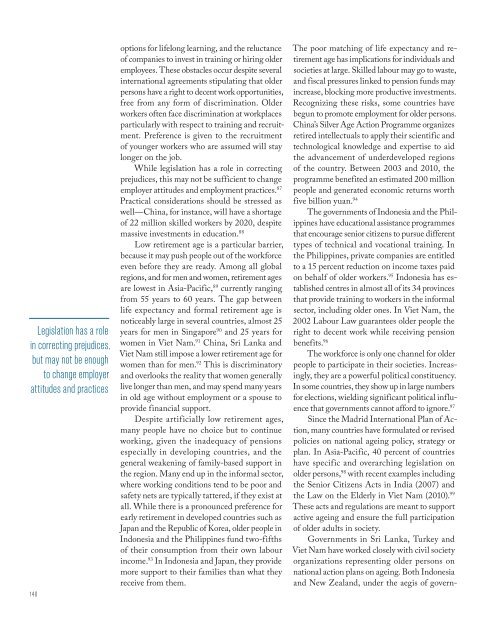SHAPING THE FUTURE HOW CHANGING DEMOGRAPHICS CAN POWER HUMAN DEVELOPMENT
1VPo4Vw
1VPo4Vw
You also want an ePaper? Increase the reach of your titles
YUMPU automatically turns print PDFs into web optimized ePapers that Google loves.
Legislation has a role<br />
in correcting prejudices,<br />
but may not be enough<br />
to change employer<br />
attitudes and practices<br />
140<br />
options for lifelong learning, and the reluctance<br />
of companies to invest in training or hiring older<br />
employees. These obstacles occur despite several<br />
international agreements stipulating that older<br />
persons have a right to decent work opportunities,<br />
free from any form of discrimination. Older<br />
workers often face discrimination at workplaces<br />
particularly with respect to training and recruitment.<br />
Preference is given to the recruitment<br />
of younger workers who are assumed will stay<br />
longer on the job.<br />
While legislation has a role in correcting<br />
prejudices, this may not be sufficient to change<br />
employer attitudes and employment practices. 87<br />
Practical considerations should be stressed as<br />
well—China, for instance, will have a shortage<br />
of 22 million skilled workers by 2020, despite<br />
massive investments in education. 88<br />
Low retirement age is a particular barrier,<br />
because it may push people out of the workforce<br />
even before they are ready. Among all global<br />
regions, and for men and women, retirement ages<br />
are lowest in Asia-Pacific, 89 currently ranging<br />
from 55 years to 60 years. The gap between<br />
life expectancy and formal retirement age is<br />
noticeably large in several countries, almost 25<br />
years for men in Singapore 90 and 25 years for<br />
women in Viet Nam. 91 China, Sri Lanka and<br />
Viet Nam still impose a lower retirement age for<br />
women than for men. 92 This is discriminatory<br />
and overlooks the reality that women generally<br />
live longer than men, and may spend many years<br />
in old age without employment or a spouse to<br />
provide financial support.<br />
Despite artificially low retirement ages,<br />
many people have no choice but to continue<br />
working, given the inadequacy of pensions<br />
especially in developing countries, and the<br />
general weakening of family-based support in<br />
the region. Many end up in the informal sector,<br />
where working conditions tend to be poor and<br />
safety nets are typically tattered, if they exist at<br />
all. While there is a pronounced preference for<br />
early retirement in developed countries such as<br />
Japan and the Republic of Korea, older people in<br />
Indonesia and the Philippines fund two-fifths<br />
of their consumption from their own labour<br />
income. 93 In Indonesia and Japan, they provide<br />
more support to their families than what they<br />
receive from them.<br />
The poor matching of life expectancy and retirement<br />
age has implications for individuals and<br />
societies at large. Skilled labour may go to waste,<br />
and fiscal pressures linked to pension funds may<br />
increase, blocking more productive investments.<br />
Recognizing these risks, some countries have<br />
begun to promote employment for older persons.<br />
China’s Silver Age Action Programme organizes<br />
retired intellectuals to apply their scientific and<br />
technological knowledge and expertise to aid<br />
the advancement of underdeveloped regions<br />
of the country. Between 2003 and 2010, the<br />
programme benefited an estimated 200 million<br />
people and generated economic returns worth<br />
five billion yuan. 94<br />
The governments of Indonesia and the Philippines<br />
have educational assistance programmes<br />
that encourage senior citizens to pursue different<br />
types of technical and vocational training. In<br />
the Philippines, private companies are entitled<br />
to a 15 percent reduction on income taxes paid<br />
on behalf of older workers. 95 Indonesia has established<br />
centres in almost all of its 34 provinces<br />
that provide training to workers in the informal<br />
sector, including older ones. In Viet Nam, the<br />
2002 Labour Law guarantees older people the<br />
right to decent work while receiving pension<br />
benefits. 96<br />
The workforce is only one channel for older<br />
people to participate in their societies. Increasingly,<br />
they are a powerful political constituency.<br />
In some countries, they show up in large numbers<br />
for elections, wielding significant political influence<br />
that governments cannot afford to ignore. 97<br />
Since the Madrid International Plan of Action,<br />
many countries have formulated or revised<br />
policies on national ageing policy, strategy or<br />
plan. In Asia-Pacific, 40 percent of countries<br />
have specific and overarching legislation on<br />
older persons, 98 with recent examples including<br />
the Senior Citizens Acts in India (2007) and<br />
the Law on the Elderly in Viet Nam (2010). 99<br />
These acts and regulations are meant to support<br />
active ageing and ensure the full participation<br />
of older adults in society.<br />
Governments in Sri Lanka, Turkey and<br />
Viet Nam have worked closely with civil society<br />
organizations representing older persons on<br />
national action plans on ageing. Both Indonesia<br />
and New Zealand, under the aegis of govern-


